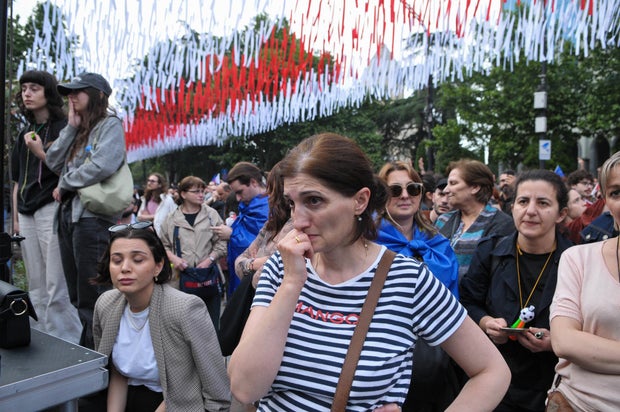The speaker of Georgia’s parliament said he signed into law on Monday a divisive measure that drew weeks of protests by critics — of which at least 20 were detained, including two US citizens — who claim that this will restrict media freedom and jeopardize the country’s chances of joining the European Union.
House Speaker Shalva Papuashvili acted after the legislature, controlled by the ruling Georgian Dream party, overrode an attempted veto of the bill by President Salome Zourabichvili.
Nicolo Vincenzo Malvestuto/Getty Images
Approved by lawmakers last month, the measure requires media outlets, non-governmental organizations and other nonprofit groups to register as “advocating the interests of a foreign power” if they receive more than 20% of their funding from the exterior.
Zourabichvili, who is increasingly at odds with the ruling party, opposed the bill, accusing the Georgian Dream party of endangering Georgia’s future and “hindering the path to becoming a full member of the free and democratic world”.
The government argues the law is necessary to curb what it considers to be harmful foreign actors trying to destabilize the South Caucasus nation of 3.7 million people. Many journalists and activists say their real aim is to stigmatize them and restrict debate ahead of parliamentary elections scheduled for October.
Opponents denounced him as “Russian law” because it resembles measures implemented by the Kremlin to suppress independent media, non-profit organizations and activists. They say the measure may have been pushed by Moscow to thwart Georgia’s chances of greater integration with the West.
Prime Minister Irakli Kobakhidze dismissed the criticism on Monday, calling it “unnecessary emotions that had only an artificial basis.”
“Now the law has come into force and we all have to act pragmatically, with a cool mind and put aside unnecessary emotions,” he said.
Over the weekend, the opposition United National Movement said a mob of masked men attacked its central offices in Tbilisi, breaking windows and damaging property. He alleged that the attackers were linked to the ruling party. The Ministry of the Interior opened an investigation into the material damage.
The legislation is almost identical to a measure the ruling party was pressured to withdraw last year after massive street protests. New demonstrations took over Georgia again, this time with the new bill being approved in parliament. Protesters fought with police, who used tear gas and water cannons to disperse them.
Daro Sulakauri/Getty
After signing the bill, Papuashvili reaffirmed that its main objective was to “increase the resistance of Georgia’s political, economic and social systems to external interference”.
“If non-governmental organizations and the media want to participate in the decision-making process and influence the lives of the Georgian people with funding from foreign governments, they must meet the minimum standard of transparency – the public must know who is behind of each participant”, he said.
Papuashvili said that once the new law is published on Tuesday, the Justice Ministry will have 60 days to complete the necessary formalities. After that, those affected by the law must register and declare their finances for the previous year.
The Georgia Civil Society Foundation, a nongovernmental group, said Thursday it was preparing to challenge the legislation in Georgia’s constitutional court.
The European Union’s foreign policy arm said the law’s adoption “negatively impacts Georgia’s progress on the EU path.”
The EU offered Georgia candidate status in December, while making clear that Tbilisi needs to implement key policy recommendations for its membership bid to progress.
Following the bill’s passage last month, U.S. Secretary of State Antony Blinken announced that travel sanctions would be imposed on officials “who are responsible for or complicit in undermining democracy in Georgia.” He expressed hope that Georgia’s government will reverse course and “take steps to advance your nation’s democratic and Euro-Atlantic aspirations.”
The United National Movement describes the law as part of Georgian Dream’s efforts to drag the country into Russia’s sphere of influence – a claim the ruling party angrily rejects. Georgian Dream was founded by Bidzina Ivanishvili, a former prime minister and billionaire who made his fortune in Russia.
Relations between the two countries have often been difficult since Georgia became independent following the collapse of the Soviet Union in 1991.
In 2008, Russia fought a brief war with Georgia, which had made a failed attempt to regain control over the breakaway province of South Ossetia. Moscow then recognized South Ossetia and another breakaway province, Abkhazia, as independent states and reinforced its military presence in those locations. Most of the world considers both regions to be parts of Georgia.
Tbilisi has severed diplomatic relations with Moscow and the status of the regions remains a key irritant, despite relations between Russia and Georgia having improved in recent years.
bol co
jogo de terror online
novela sbt ao vivo
wishlist
musica terra seca
taça png

























